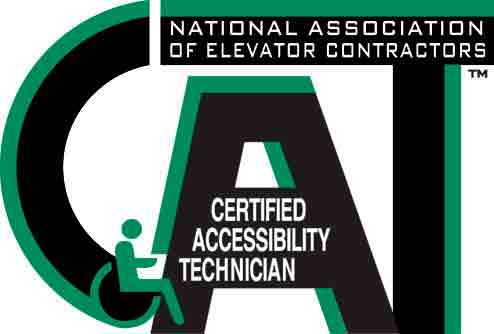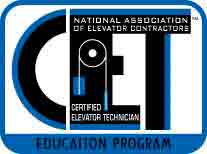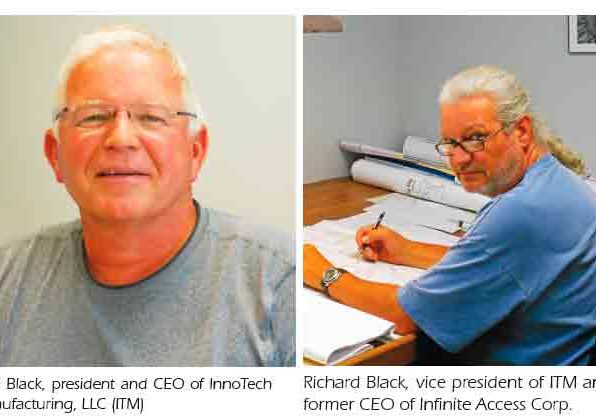A look at the National Association of Elevator Contractors (NAEC) Certified Elevator Technician (CET®) program and Certified Accessibility and Private Residence Lift Techni-cian (CAT®) certification programs
The elevator industry is faced with extreme challenges that require field elevator technicians to be experienced and knowledgeable in installing, putting into operation and maintaining sophisticated systems taking full advantage of leading-edge technologies for efficiency and safety. Also, the industry is faced with challenges that require field elevator technicians to be experienced and knowledgeable with legacy elevator systems installed decades ago that must be upgraded (when possible) and maintained. As a result, there is a need for a comprehensive approach to training new elevator technicians that must include study through formalized programs, such as the National Association of Elevator Contractors (NAEC) Certified Elevator Technician (CET®) program and Certified Accessibility and Private Residence Lift Technician (CAT®) certification programs.
History
In the 1990s, NAEC surveyed its members regarding educational opportunities in the elevator industry, and it was determined expanding such educational opportunities was necessary. NAEC began ambitious educational curricula in partnership with Elevator World, Inc. to provide its members two extensive certification programs, CET and CAT (ELEVATOR WORLD, September 2010). Many volunteer hours were devoted to this development, as industry experts poured in passion and commitment.
CET
The CET program was founded in November 2001, the same year the Model Elevator Law placed greater emphasis on certification and education. The purpose of the CET certification is to provide the elevator industry with a means of obtaining and verifying knowledge and experience requirements related to compliance with industry codes, elevator- and escalator-specific technical theory, components and competencies. In September 2011, the NAEC CET Certification Program received American National Standards Institute (ANSI) accreditation under ANSI/ISO/IEC 17024, making the CET program the only ANSI Personnel Certification Accreditation Committee-accredited elevator-industry program (EW, December 2011).
The CET® Education Program is the nationally recognized training program included in NAEC’s National Guidelines for Apprenticeship Standards (C2011-03) approved by the U.S. Department of Labor Office of Apprenticeship. The CET program is a four-year program that includes 12 courses of study matching on-the-job skills portfolios meeting Federal Apprenticeship requirements of 144 classroom hours of relation instruction and 2,000 on-the-job training hours annually. The program consists of two levels, the core curriculum (Courses 1-4), which takes approximately two years to complete (321 total classroom hours) and the advanced curriculum (Courses 5-12), which also takes approximately two years to complete (290 total classroom hours).
Candidate Qualifications for Education Program
- High-school diploma, GED or equivalent
- Eighteen years of age
- Access to the supervision of a CET supervisor
- Paying the US$150-member/US$550-nonmember application fee and US$150-member/US$550-nonmember annual candidate administration fee (does not include course materials)
- Ability to read and write in English
- Be a citizen of the U.S. or be legally authorized by the U.S. government to work and participate in a training program. (The exception to this requirement is for individuals living outside the U.S. and not working in the U.S.)
- Basic skills assessment (optional)
Core Curriculum (Courses 1-4)
- Course 1: Introduction to Elevators
- Course 2: Basics of Installing Elevator Components
- Course 3: Maintenance Practices and Testing
- Course 4: Electrical Safety and Theory
Advanced Curriculum (Courses 5-12)
- Course 5: Elevator Doors and Equipment
- Course 6: Traction Elevators: Motors, Motor Control and Fault Finding
- Course 7: Electrical Wiring and Equipment
- Course 8: Electrical Safety and Theory
- Course 9: Hydraulic Theory and Installation
- Course 10: Machinery Troubleshooting, Rope Replacement
- Course 11: Escalators and Moving Walks
- Course 12: Accessibility
CAT
In September 1988, the NAEC Board of Directors voted unanimously to endorse the concept of providing special recognition to the accessibility-lift-associated members of NAEC and to seek a means of giving this segment of the industry an identity under the auspices of NAEC. Through the CAT program, contractors and other employers in the industry can provide a cost-effective approach to training employees and potential employees. The CAT Candidate Program is a two-year education certification program that began in 2003. The program is structured to meet Federal Apprenticeship requirements (144 classroom hr./ 2,000 on-the-job training hr. annually).
Candidate Qualifications for Education Program
- High-school diploma or GED
- Eighteen years of age
- Basic-skills assessment (optional)
- Approval of completed Candidate Application
- Annual fee of US$150 for NAEC members/US$550 for nonmembers (does not include course materials)
- Access to the supervision of a CAT supervisor
The CAT Curriculum
- Course 1: Introduction to the Vertical Transportation Industry
- Course 2: Vertical Platform Lifts
- Course 3: Inclined Platform Lifts
- Course 4: Inclined Stairway Chairlifts
- Course 5: Private Residence Elevators
Conclusion
The first CET was certified in January 2002, and the first CAT was certified in February 2004. There is an annual renewal requirement of 10 hr. of approved continuing education, including safety. As of August, NAEC had 443 CET-certified individuals and 75 CAT-certified individuals, with another 261 CET candidates and 27 CAT candidates, respectively, in CET and CAT education programs. The following states currently accept CET/CAT for licensing and/or continuing education:
| Alabama | Illinois | Utah |
| Arkansas | Indiana | Vermont |
| California | Kentucky | Virginia |
| Florida | Maryland | Washington |
| Georgia | Oklahoma | West Virginia |
For more information, contact NAEC Deputy Director Faye Carter-Powell at phone: (770) 760-9660, e-mail: faye@naec.org or website: www.naec.org.

Get more of Elevator World. Sign up for our free e-newsletter.










